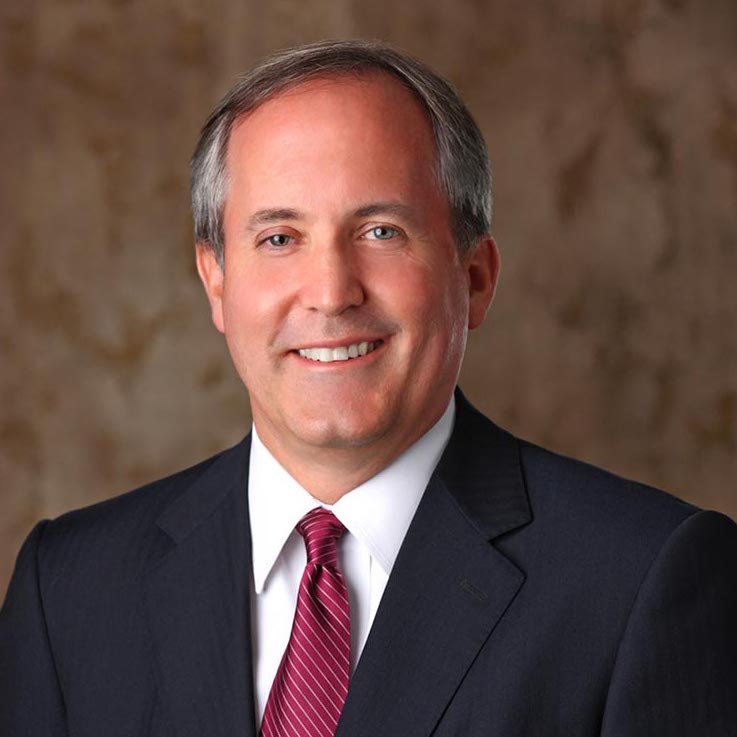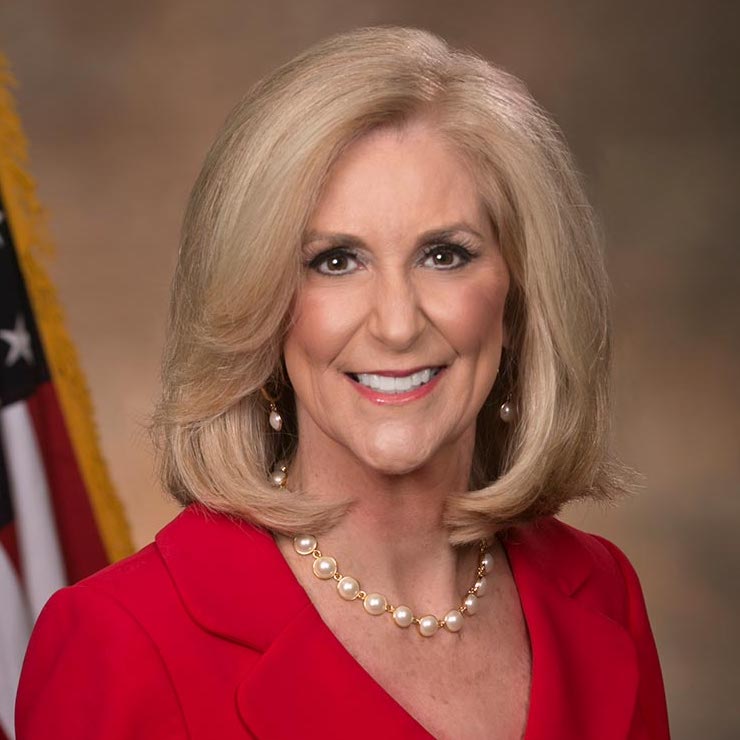According to the nonpartisan National Association of Attorneys General, a state attorney general’s job is to represent the public interest—not private, special interests—by, among other things, “enforcing federal and state environmental laws.” Attorneys general (AGs) in the five states most vulnerable to climate change, however, are doing the exact opposite: Instead of defending their constituents, they are defending the fossil fuel industry.
Each of the states—Florida, Louisiana, Mississippi, South Carolina and Texas—have sustained billions of dollars in climate change-related damage. Regardless, their AGs routinely collaborate on lawsuits and other actions to attack federal environmental safeguards, especially those designed to mitigate the impact of global warming. Why? At least partly—if not largely—because the AGs and their political organization, the Republican Attorneys General Association (RAGA), receive substantial financial support from fossil fuel companies, electric utilities, and their respective trade groups.
Here’s a roundup of what these AGs have been doing to make a bad situation worse.
Texas: Ken Paxton
Texas AG Ken Paxton’s constituents are suffering extreme heat, drought, flooding, hurricanes and wildfires, all exacerbated by climate change. The third hottest state, Texas annually averages more than 60 dangerously hot days, which are expected to nearly double by 2050 to 115 days per year, second only to Florida. Texas also faces the biggest threat in the nation from summer droughts, which are projected to become even more severe. As for hurricanes, Texas suffered no fewer than 81 tropical or subtropical cyclones from 1980 through 2021. In 2017, Hurricane Harvey—one of the worst—drenched Houston with more than 4 feet of rain, killed at least 88 people, and caused $125 billion in damage.

How has Paxton responded? By railing against what he calls a “radical climate change movement” and suing the federal government to protect corporate polluters.
In 2015, when he took office as AG after stints in the Texas Legislature, he sued the Environmental Protection Agency for strengthening a standard for ground-level ozone, better known as smog. A year later, he sued the EPA again for proposing new rules to reduce methane leaks downstream from oil and gas production sites.
Then, in 2017, Paxton defended ExxonMobil against investigations by New York and Massachusetts AGs to determine if the company broke any laws when it lied to shareholders and the general public about the threat of climate change. Along with AGs from 10 other states, including Louisiana and South Carolina, he filed an amicus (friend of the court) brief in a US District Court in New York arguing that the investigation impinged on ExxonMobil’s First Amendment right of free speech. (The First Amendment, Paxton should know, does not protect fraud.)
Perhaps the most consequential of all Paxton’s actions, however, is a lawsuit he and AGs from 19 other states, including Louisiana, Mississippi and South Carolina, filed in 2021 challenging the EPA’s authority to curb power plant carbon emissions. The case ultimately wound up in the US Supreme Court, which, in its controversial West Virginia v. EPA decision, upheld the EPA’s authority to regulate such emissions under the Clean Air Act but significantly constrained its ability to do so.
More recently, Paxton and AGs from 24 other states, including Florida, Louisiana, Mississippi and South Carolina, sued the Biden administration over a Labor Department rule allowing retirement plan managers to consider environmental, social and governance (ESG) factors—including the impact climate change has on companies’ bottom lines. Paxton falsely claimed in a January press release that the rule prioritizes what he calls “woke” investing over protecting retirement savings when, in fact, the rule expressly prohibits fund managers from prioritizing ESG goals over earnings. (On March 20, President Biden vetoed a Republican-led bill that would have overturned the Labor Department rule.)
The main beneficiary of Paxton’s efforts? The oil and gas industry, of course. As his top industry sector contributor, it has donated more than $3.9 million to his campaigns since 2002, according to OpenSecrets’ compilation of contribution data. And since he became Texas AG, his largest oil and gas industry donations have come from individuals, including CrownQuest Operating CEO Timothy Dunn ($605,000), Midland Energy founder Syed Javaid Anwar ($495,000), and Desert Royalty CEO Kyle Stallings ($290,000), according to contribution data compiled by Transparency USA. Over that time, he also received funding from some of the biggest names in the business, including Chevron, ExxonMobil, Koch Industries, Phillips 66 and Valero Energy, as well as RAGA, which kicked in $1.18 million.
Louisiana: Jeff Landry
Nearly a million residents of Louisiana—the second hottest state—are threatened by coastal flooding, and between 2000 and 2021 the state was hit by 28 tropical or subtropical cyclones. The most devastating, Hurricane Katrina in 2005, was the costliest natural disaster in US history, killing nearly 1,200 Louisianans and causing more than $160 billion in damage. More recently, Hurricane Ida battered the state with 150 mile-per-hour winds and a 14-foot storm surge in 2021, causing $75 billion in damage.

Nevertheless, Jeff Landry—Louisiana’s AG since January 2016—seems more interested in defending the fossil fuel industry than his constituents. He routinely partners with other GOP AGs to shield the industry from federal action on climate change.
For example, in October 2021—the same month he signed onto the West Virginia v. EPA lawsuit—Landry joined 18 other AGs, including Paxton and AGs from Mississippi and South Carolina, on a letter to two Senate committees urging them to vote against tighter restrictions on methane emissions, which are considerably worse for the climate than carbon dioxide.
Landry’s deep ties to the oil and gas industry predate his time as Louisiana’s AG. Since 2007, when he ran unsuccessfully for state senator, the industry has been his top industrial sector donor, contributing more than $875,000 to his campaigns, according to OpenSecrets data. The industry also funds his Cajun PAC II, which—as a Super PAC—can accept unlimited contributions. Among Cajun PAC II’s biggest donors are Hilcorp Energy CEO Jeffery Hildebrand, who has donated $95,000; Harvey Gulf, an oilfield services company that contributed $50,000; and Dunn Exploration, which donated $47,500, according to a February 2022 post by a Baton Rouge Advocate investigative reporter.
In 2011, while serving a term in the US House of Representatives from Louisiana’s 3rd Congressional District, Landry made national news by holding up a sign that read “DRILLING = JOBS” during President Obama’s national jobs plan speech. But he became even more entwined with the industry after becoming AG. Between 2019 and last December, he served on the board of Harvey Gulf, which paid him between $50,000 and $100,000 per year for legal advice, according to a Baton Rouge Advocate exposé, substantially padding his annual AG salary of $110,000. Landry, in turn, hired Harvey Gulf owner Shane Guidry to serve as a “special agent/investigator” for his AG office. Although Louisiana statute explicitly bars AGs from practicing law outside of the job, the Louisiana Ethics Administration has yet to issue an opinion regarding Landry’s relationship with Harvey Gulf.
Mississippi: Lynn Fitch
The sea level off the coast of Mississippi—the fifth hottest state—is rising more rapidly than in most other coastal areas, largely because the land is sinking. Currently 75,000 Mississippians are threatened by coastal flooding, and by 2050 an estimated 13,000 more residents will be at risk. Like its Gulf Coast neighbors, the state is routinely ravaged by hurricanes. In 1998, Hurricane Georges struck Mississippi’s coast near Biloxi, dropping 15 to 25 inches of rain and causing nearly $13.9 billion in damage. Seven years later, Hurricane Katrina strafed the Mississippi coast, killing more than 230 people and causing $32 billion in damage.

Hurricanes or no hurricanes, Mississippi AG Lynn Fitch, who took office in January 2020, takes a dim view of federal action on climate change. The headline of her July 5, 2022, press release, “AG Fitch Continues to Fight Biden’s Radical Environmental Agenda,” pretty much sums up her attitude. It announced that Fitch and 10 other AGs, including Landry, Paxton and Alan Wilson from South Carolina, were challenging the National Highway Traffic Safety Administration’s new fuel economy standards. According to NHTSA, they would save US drivers $140 billion at the pump by 2030 and slash fuel consumption by 234 billion gallons through 2050.
No surprise, Fitch is an oil and gas industry favorite. Since 2011, the industry has donated $78,450 to her campaigns for state treasurer and attorney general, according to OpenSecrets data, placing the sector among her top 10 industry contributors. Electric utilities, meanwhile, gave her $44,750. Her top donors include RAGA ($150,000), the independent oil producer William D. Mounger ($41,000), and Mississippi Power ($29,000), a wholly owned subsidiary of the Atlanta-based Southern Company, the second-largest utility in the country based on the number of its customers.
Florida: Ashley Moody
Florida is ground zero for climate impacts. Not only does it rank as the hottest state, it also is home to seven of the top 10 hottest US cities, and dangerously steamy days are predicted to jump from 25 to 130 a year by 2050, more than any other state. At the same time, routine flooding is already a major problem. Some 1 million Florida homes will be at risk by the end of the century, largely because the state sits on porous limestone and the sea level around the state, which has gone up 8 inches since 1950, could rise another 14 to 16 inches by 2050, according to the National Oceanic and Atmospheric Administration. Meanwhile, the state has suffered 79 tropical or subtropical cyclones since 2000. One of the most recent, Hurricane Ian, slammed into the state’s Gulf Coast last fall, causing $50 billion to $65 billion in insured damages. It was the costliest disaster in the country last year.

Despite these ever-more ominous incidents, climate change did not make Florida AG Ashley Moody’s list of the top issues she plans to address. Last June, she told the Tampa Bay News 9 television station that she wants to make Florida “a safer, stronger place to live,” and specifically cited human trafficking, elder abuse and violent crime. All major problems to be sure, but no more than South Florida under water.
When Moody ran for attorney general in 2018, she promised she wouldn’t politicize the office. The AG’s role, she said during a Tampa Bay News 9 debate, “is not to advance a political agenda or pick topics that are personal to me and use the office to sue anybody I can come up with.”
After she took office in January 2019, that pledge went out the window. She became a team player, joining GOP AG initiatives on a range of issues. For example, along with 17 other state AGs, including Landry, Fitch and Alan Wilson from South Carolina, Moody supported Texas AG Paxton’s December 2020 lawsuit to block four battleground states’ certification of Joe Biden’s presidential election victory.
Moody also jumped in head-first to protect the fossil fuel industry. In June 2021, she joined a lawsuit challenging the Biden administration’s decision to revoke the Keystone XL pipeline permit. Twenty-two other state AGs were on board, including the AGs from the other four most vulnerable states to climate change. More recently, Moody issued a press release announcing that she and 19 other AGs, including Fitch, Landry, Paxton and Wilson, filed a comment with the US Department of Transportation opposing a rule requiring states to reduce on-road carbon dioxide emissions to net-zero by 2050.
Since 2017, Moody has received nearly $339,000 from oil and gas companies and electric utilities as well as $300,000 from RAGA, according to Transparency USA data. More than half of her energy industry-related donations came from Duke Energy ($155,000), whose Florida power plants provide mainly fossil gas-fired electricity for three dozen counties, and Teco Energy ($85,000), owner of Tampa Electric and Peoples Gas, which supplies fossil gas to more than 400,000 customers across the state.
South Carolina: Alan Wilson
Like Florida, Louisiana, Mississippi and Texas, South Carolina—the seventh hottest state—is in the crosshairs of the climate crisis. Between 1990 and 2016, the sea level off its 2,876-mile coast rose 6 inches, at least partly because the land is sinking. By 2030, it is expected to rise another 6 inches, posing a significant threat to the state’s tourism economy, and more than 16,000 homes will be at risk of chronic flooding by 2045. Since 2000, more than 20 hurricanes have hit the South Carolina coast. One of the worst, Hurricane Florence, caused at least $1.2 billion in damage in September 2018. Four years later, Hurricane Ian—after pummeling Florida—smashed into North Myrtle Beach, causing an estimated $13 million in damage.

Even so, like his counterparts in the four other most vulnerable states, South Carolina AG Alan Wilson bends over backward to help the fossil fuel industry, and he has been rewarded for doing so. Since 2010, when he first ran for AG, Wilson has received more than $143,000 from electric utilities and fossil fuel companies combined, according to OpenSecrets data. The Electric Cooperatives of South Carolina ($24,300), Duke Energy ($21,000) and RAGA ($21,000) are among Wilson’s top 10 donors. Koch Industries chipped in $14,000, while Alliance Coal and Dominion Energy both gave him $7,000.
Besides participating in the AG lawsuits and other actions cited above, Wilson joined 23 other Republican AGs who threatened to sue the Security and Exchange Commission (SEC) last July if the agency adopted a new rule requiring publicly traded companies to disclose their climate change-related risks and explain how they plan to address them.
Wilson also has played a key behind-the-scenes role as chairman of RAGA three times since he took office in 2011, most recently between November 2021 and November 2022. As chairman, he met with corporate and law firm executives to solicit big-dollar donations for RAGA as well as his own reelection campaigns, according to records obtained by the nonpartisan, nonprofit watchdog American Oversight. Those donations have enabled RAGA to support sustained, multipronged efforts to challenge federal government initiatives that threaten the interests of RAGA’s benefactors.
RAGA: A Stealth Power Player
Most people have never heard of RAGA. If they have, it is probably for helping instigate the January 6, 2021, insurrection at the US Capitol. The Rule of Law Defense Fund, RAGA’s fundraising arm, made robocalls the day before the event encouraging people to march on the Capitol “to stop the steal,” and Texas AG Paxton riled up the crowd on the Ellipse on the morning of January 6 before President Trump took the stage.
Less known is RAGA’s work on behalf of the fossil fuel industry. In 2014, the New York Times published an eye-opening investigation of its secret alliance based on thousands of pages of correspondence between energy industry executives and Republican attorneys general trying to block Obama administration proposals to address the climate crisis. RAGA AGs, the Times reported, are “the object of aggressive pursuit by lobbyists and lawyers who use campaign contributions, personal appeals at lavish corporate-sponsored conferences and other means to push them to drop investigations, change policies, negotiate favorable settlements or pressure federal regulators.” In 2014 alone, the Times found, the fossil fuel industry donated some $16 million to at least a dozen Republican AG candidates.
That “aggressive pursuit” goes both ways. According to emails and documents obtained by the nonpartisan Center for Media and Democracy (CMD), Republican AGs offer lobbyists and lawyers private, confidential meetings in exchange for contributions to RAGA, which—as a 527 political organization—can raise unlimited amounts of cash from individuals and corporations. Another RAGA document, obtained by the nonprofit watchdog group Documented, detailed the degree of access funders get at RAGA conferences, retreats and summits depending on how much they spend on their annual RAGA membership fee.
These annual “pay-to-play” contributions, ranging from $15,000 to $250,000, pay off. As CMD reported, less than two weeks after representatives from fossil fuel companies, electric utilities, and their trade groups attended a RAGA conference in August 2015, Republican AGs petitioned federal courts to block the Obama administration’s Clean Power Plan, which would have established the first-ever limits on US power plant carbon emissions. Among the conference’s attendees were executives from the American Coalition for Clean Coal Electricity, a coal industry trade group now called America’s Power, which gave RAGA $378,250 between 2015 and 2016; Koch Industries, which donated $350,000; coal giant Murray Energy, which contributed $250,000; and Southern Company, which gave RAGA $85,000, according to materials reviewed by CMD.
From its inception in 1999, RAGA—whose primary purpose is to elect (and reelect) Republican AGs—has been bankrolled by companies and trade associations seeking favors, including regulatory “relief”—rollbacks of consumer, environmental, public health and workplace safeguards. In recent years, top RAGA contributors have been corporations and trade groups from the gun, fossil fuel, health care, pharmaceutical and tobacco industries, along with the US Chamber of Commerce and the Judicial Crisis Network (now called the Concord Fund), a dark money group that backs conservative judicial appointments, promotes voting restrictions, and funds right-wing advocacy groups.
Meanwhile, fossil fuel companies, electric utilities and their trade groups—including the American Fuel & Petrochemical Manufacturers, American Petroleum Institute and National Mining Association—have collectively donated more than $10 million to RAGA over the last decade, according to Opensecrets data and RAGA contribution and expenditure report documents, called 8872 forms. Leading contributors include Anadarko Petroleum ($1.5 million), the Ariel Corporation ($2.1 million), Koch Industries ($2 million) and Noble Energy ($1 million).
That kind of money buys loyalty, and the collective actions of RAGA members—particularly the AGs from Florida, Louisiana, Mississippi, South Carolina and Texas—show just how effective it can be at frustrating efforts to address climate change.
As a state’s top legal officer, AGs are supposed to function as the “people’s lawyer,” representing the interests of their state’s residents. All swear to faithfully discharge their duties. By putting the interests of the fossil fuel industry ahead of the health and safety of their own constituents, however, these five AGs are in blatant violation of their oath of office.
Note: This column’s list of the five most vulnerable states to climate change is based on the following analyses: Brookings Institution (January 2019), The Hill (November 2020), US News & World Report (December 2020), SafeHome.org (June 2021), Climate Check (October 2021), CNET (November 2021), Bankrate (July 2022), Policygenius.com (October 2022), and The Hill (October 2022).

